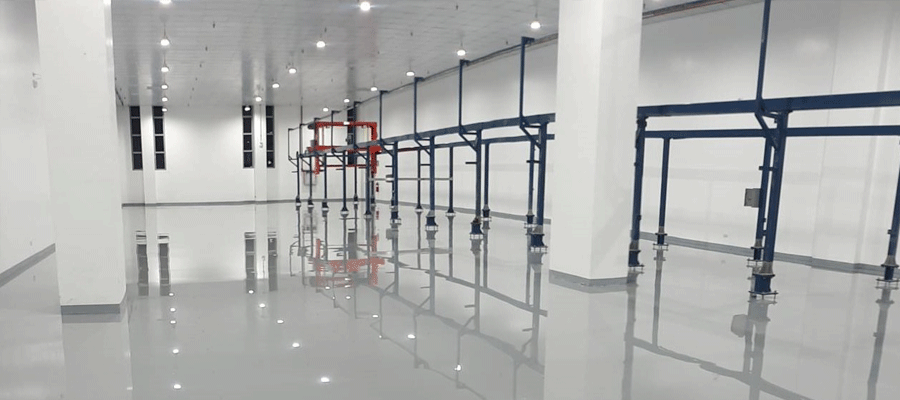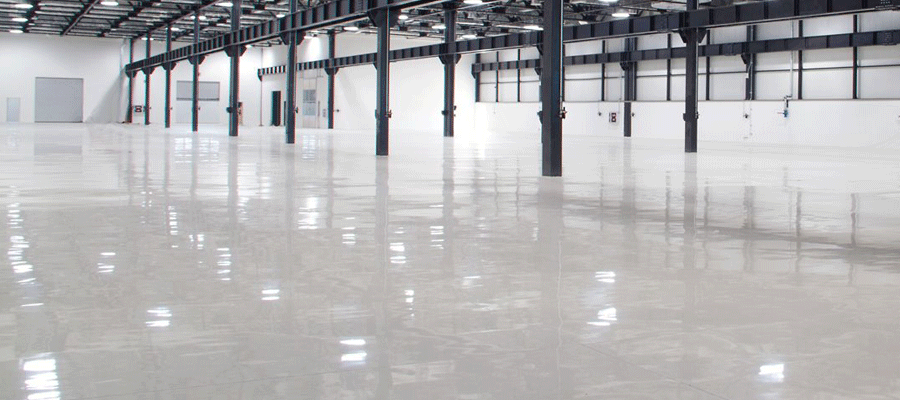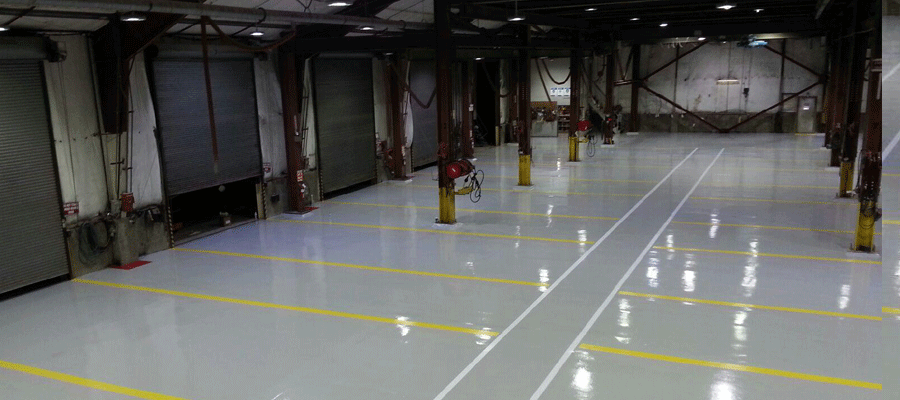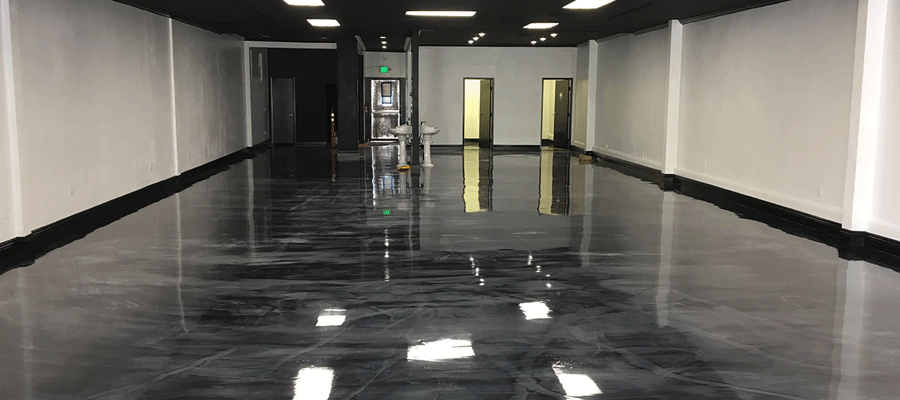Commercial epoxy flooring is perfect for high-traffic areas, such as restaurants and stores. Commercial floors are difficult areas to maintain, with lots of dirt and grime damaging the flooring. Epoxy can be used in any commercial space because it is durable enough to handle large amounts of foot traffic.
Most people choose commercial epoxy flooring in busy shops or warehouses when they’re looking for a floor that isn’t affected by water damage. Epoxy is stain-resistant, rust-resistant, non-slip, chemical resistant, and scratch-proof, making it an ideal choice for businesses where there’s a chance water or debris could cause damage.
This article will provide information on what commercial epoxy is, discuss the benefits of commercial epoxy, and provide detail on where to install commercial epoxy. It will also provide information on how to maintain commercial epoxy flooring in order to keep it looking amazing for years.
What is Commercial Epoxy?

Commercial epoxy is a two-part resin that cures when mixed together at room temperature. When the resin cures, it creates a synthetic surface that’s extremely hard wearing and slip-resistant. The mixture contains powdered pigments, so you can create different colors according to your preference when you mix the resins together.
The surface of a commercial epoxy floor is UV-resistant and weather-resistant, making it perfect for use in high-traffic areas. The flooring is available in a wide array of colors and textures, so you can create a unique look that will make your business stand out from the competition.
Benefits of Commercial Epoxy Floors

There are many benefits to using commercial epoxy flooring. Some include:
Chemical Resistance – Because this type of flooring is made with synthetic materials, it’s impervious to most chemicals, including acids and bases. This makes it a great option if you’re planning on setting up a shop near a busy road or industrial area where there might be chemicals present in the air or nearby water supply.
Slip Resistance – You’ll never have to worry about customers or employees slipping because commercial epoxy flooring is one of the most slip-resistant surfaces available. The non-slip properties apply to both wet and dry conditions, so it’s perfect for areas that may get damp or humid.
Long-Lasting – Epoxy floors are extremely durable and will last longer than other types of flooring, including marble, tile, ceramic, granite, slate, stone, and carpet. Because epoxy is not affected by water damage like porous materials are, the surface can stay looking amazing for years to come.
Increased Value – When you have an epoxy floor installed, it can increase the value of your commercial property. It’s estimated that installing commercial epoxy floors adds about 7% to a building’s resale price.
Easy to Maintain – Maintaining commercial epoxy floors is quick and painless. All you have to do is regularly sweep, mop with water, or use a steam cleaner once or twice per week.
Customizable – This type of flooring is highly customizable so that you can create a unique look. You can choose from many different colors, textures, finishes, and patterns to give your business the best possible appearance.
Where to Install Commercial Epoxy Floors

You can install commercial epoxy in any high-traffic area of your business, including warehouses, shops, showrooms, restaurants, hospitals, churches, schools, fitness centers/gyms, and retail stores. The types of businesses using commercial epoxy include:
· Retail Stores – Slippery floors can be dangerous for both customers and employees. Commercial epoxy provides a safe, slip-resistant surface that’s easy to clean. Anyone who’s running a business knows how important it is to keep the floor in front of the cash register looking smooth and fresh.
· Schools – In addition to being slip-resistant, commercial epoxy resists scuffing, so the flooring will look amazing even after being walked on with heavy foot traffic or scooters. Epoxy floors are also easy to clean with a mop and water, so there’s no need for expensive cleaners or highly trained professionals to maintain them properly.
· Warehouses – If your warehouse gets wet from rain or humidity, installing commercial epoxy flooring will ensure your business is protected. The epoxy coating resists water damage, so you won’t have to worry about needing costly repairs in the future.
· Fitness Centers/Gyms – Commercial epoxy floors are available with a patented non-slip surface that is tough enough to handle repeated abuse from exercise equipment but smooth enough that everyone is safe when they’re walking through the area. It’s perfect for keeping athletes-related injuries down and customers coming back for more.
Restaurants – Cleaning commercial epoxy floors is a breeze, so you save time and money when it comes to keeping your restaurant looking great. The surface will look new even after heavy traffic and years of wear and tear.
Commercial Epoxy Flooring Materials

There are many different materials that can be used for commercial epoxy flooring. Each material has its own benefits and disadvantages:
Flake Epoxy Flooring: This type of epoxy is typically very affordable and easy to install. It can be used indoors or out, so it’s an excellent choice for any area of your business. Unfortunately, flake epoxy doesn’t have a long lifespan and can chip easily.
Metallic Epoxy Flooring: This type of epoxy has a long lifespan and is very durable. It’s typically more expensive than other commercial epoxy flooring options, but the price is well worth it if you want your business to get top-notch protection for your investment.
Epoxy Polymer Flooring: This type of commercial epoxy withstands heavy traffic, resists scuffing, and can be formed into different patterns. It costs more than most other types of epoxy but provides excellent slip resistance that meets ADA standards.
Epoxy Resin Flooring: This type of epoxy contains plastic resins that offer an even better grip when they’re wet or dry. Depending on how much resin is mixed into the product, this option may not last as long as other commercial epoxy flooring materials.
Epoxy Urethane Flooring: If you’re looking for maximum grip on wet surfaces, then this is the type of epoxy that you’ll want to use in your business. It’s very expensive but will provide excellent protection for your floors.
Commercial Epoxy Floors FAQs
Q: How often should I sweep or mop my commercial epoxy floor?
A: You should sweep or mop your floor once a week with a neutral cleaner, warm water, and a microfiber mop. Never allow residents to track dirt into buildings with their shoes because this could scratch the surface of your commercial epoxy flooring.
Q: What is the best way to clean up a spill on my commercial epoxy floor?
A: Commercial epoxy floors can repel spills and stains, but it’s still important to wipe up any accidents right away. If you’re using a dry mop to clean the area, avoid pushing the dirt deeper into the surface of your epoxy. Instead, use a towel or sponge to absorb as much moisture as possible before vacuuming the spot thoroughly.
Q: Can I install commercial epoxy over existing flooring?
A: You can install commercial epoxy over any permanent flooring material, including carpeting, tile, marble, vinyl sheet goods, concrete or ceramic tiles. You may need to do some patchwork if there are holes or damage to your existing floor.
Q: How often do I need to reseal my commercial epoxy floor?
A: You will need to reseal your commercial epoxy every two years, depending on the materials used in the product and how much traffic it receives.
